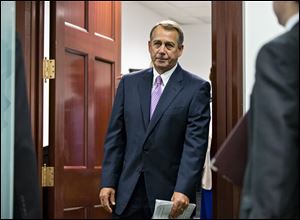
FEDERAL SHUTDOWN
U.S. on path to default, GOP warns
Boehner insists on talksabout debt and spending
10/7/2013
House Speaker John Boehner vowed on Sunday not to raise the U.S. debt ceiling without a “serious conversation” about what is driving the debt, while Democrats said it was irresponsible and reckless to raise the possibility of a U.S. default.
WASHINGTON — House Speaker John Boehner vowed on Sunday not to raise the U.S. debt ceiling without a “serious conversation” about what is driving the debt, while Democrats said it was irresponsible and reckless to raise the possibility of a U.S. default.
“The nation’s credit is at risk because of the administration’s refusal to sit down and have a conversation,” Mr. Boehner (R., Ohio) told ABC’s This Week.
There are not enough votes in the House to pass a “clean” debt limit bill without any conditions attached, he said.
Asked if that meant the United States was headed toward default if President Obama does not negotiate ahead of an Oct. 17 deadline to raise the debt ceiling, Mr. Boehner said: “That’s the path we’re on.”
The comments appeared to contradict reports late last week that Mr. Boehner had told Republicans privately that he would work to avoid default, even if it meant relying on the votes of Democrats, as he did in August, 2011.
Republicans and Democrats traded blame for a shutdown that has brought much of the government to a standstill for nearly a week.
With no end in sight, the battle over funding the government has merged into the one over the debt ceiling.
Republicans have demanded that Democrats agree to delay implementation of the Affordable Care Act, the landmark 2010 law popularly known as Obamacare, as part of any spending bill.
They also have been seeking measures to address the federal government’s long-term debt in exchange for raising its $16.7 trillion debt limit.
If the borrowing cap is not increased, the United States could go into default.
Officials and economists say such a development would seriously damage the U.S. and global economies.
“I don’t want the United States to default on its debt,” Mr. Boehner said. “But I’m not going to raise the debt limit without a serious conversation about dealing with problems that are driving the debt up. It would be irresponsible of me to do this.”
Treasury Secretary Jack Lew warned of serious consequences if “the unthinkable” were to happen and the United States defaulted.
Mr. Lew, as the President’s chief financial officer, appeared on four television shows Sunday to keep the pressure on House Republicans to pass a measure to raise the nation’s borrowing limit.
“It is irresponsible and it is reckless to take that chance, which is why Congress needs to act,” he told Fox News.
“On the 17th we run out of our ability to borrow, and Congress is playing with fire,” Mr. Lew said on the CNN program State of the Union.
He reiterated the administration’s legal opinion that Mr. Obama cannot constitutionally raise the debt ceiling by himself if Congress fails to act.
“There is no option that prevents us from being in default if we’re not paying our bills,” Mr. Lew said, rejecting the idea that the President could invoke a constitutional power or take some other action to avert economic chaos if the country breached its debt limit for the first time in history.
Since 1789, Mr. Lew added, “we’ve never gotten to the point where the United States has operated without the ability to borrow. It’s very dangerous; it’s reckless.”
Mr. Lew repeatedly dismissed questions as to why Mr. Obama would not negotiate with House Republicans over the debt limit.
Mr. Obama has said that increasing the borrowing authority is a basic congressional responsibility under the Constitution, and not one for which lawmakers can extract ransom — in this case the demand that he defund or delay his signature health-care law.
“The President wants to negotiate,” Mr. Lew said on Fox. “Congress needs to do its job, and we then need to negotiate.”
Sen. Ted Cruz (R., Texas), who has been the standard-bearer for Republican opposition to funding the government without measures to undercut the health-care law, told CNN that Congress frequently in the past had attached curbs on spending to votes to raise the debt ceiling.
On this occasion, he said, Republicans were looking for three things before raising the debt ceiling:
● a significant structural plan to reduce government spending.
● no new taxes.
● measures to “mitigate the harm from Obamacare.”
Democrats vow not to negotiate on the funding bill or the debt ceiling, arguing that it is the job of Congress to pay its bills.
Concerns that the shutdown could trim economic growth coupled with nervousness over a potential debt ceiling crisis later this month have weighed on stocks and pushed the U.S. dollar close to an eight-month low.
Investors expect volatility to rise as the shutdown continues and the debt ceiling deadline nears.